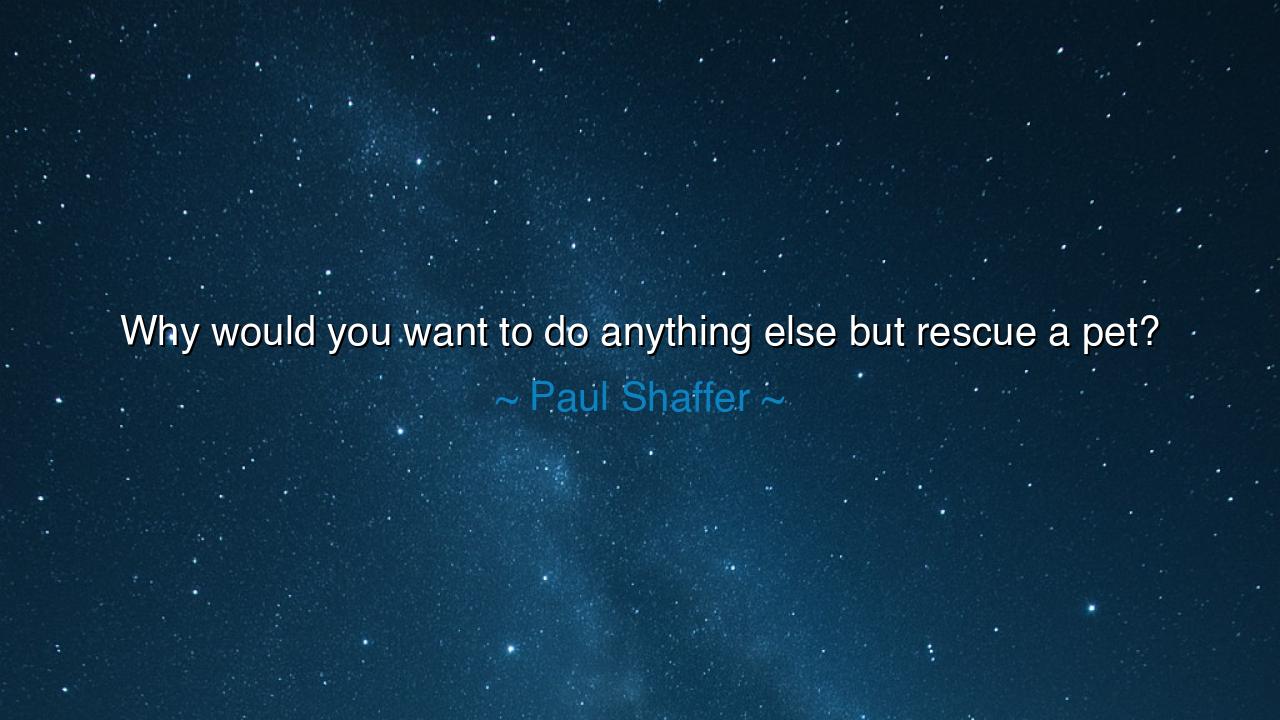
Why would you want to do anything else but rescue a pet?






Hear, O child of compassion, the words of Paul Shaffer, who asked with simple yet thunderous wisdom: “Why would you want to do anything else but rescue a pet?” At first, these words sound as though spoken in jest, a lighthearted challenge. Yet beneath their surface flows a river of truth: that to save life where it is threatened, to offer love where there is abandonment, is among the highest callings of the human spirit. To rescue is not merely to act with kindness, but to restore the balance of creation itself.
For behold, the creatures of the earth do not choose their fate. They are cast by fortune into homes of warmth or into the cold streets, into care or into neglect. The act of rescue is man’s way of healing what cruelty or chance has broken. In lifting up the abandoned, one lifts up not only the animal but also the soul of humanity, proving that compassion is stronger than indifference. Shaffer’s words, though spoken in our own time, carry the tone of ancient commandments: when life cries out in need, the noble heart cannot turn away.
Consider, O listener, the tale of Saint Roch of the olden days. Stricken by plague, abandoned by men, he crawled into the forest to die. Yet a dog found him, bringing bread and licking his wounds, and through this simple beast’s loyalty, the saint endured. It was the creature who rescued the man. In remembering this story, we see how deep runs the bond between humanity and animals: sometimes we are the saviors, and sometimes we are the saved. Shaffer’s question reminds us that the circle of compassion must never be broken.
But why would one do “anything else”? Because the world tempts us, O seeker, with paths of ease, with distractions, with pursuits of vanity. Yet when the moment of truth arrives—when a trembling creature waits in a shelter or on a street corner—the measure of the heart is revealed. To choose selfishness is to shrink; to choose rescue is to grow. For in that act of mercy, the soul tastes the eternal sweetness of purpose.
These words, then, are more than about pets. They are about the principle of mercy itself. When a man or woman extends their hand to the vulnerable, whether to a dog, a cat, or a fellow human being, they align themselves with the highest laws of the universe. The ancients called it virtue, the saints called it charity, and the poets called it love. By rescuing, one enters the great fellowship of the good, those who leave behind more life than they take.
O hear this teaching well: the call to rescue is not distant, nor reserved for saints. It is near to you. In every town, in every city, there are animals longing for shelter, waiting for a hand to reach through the darkness. If your heart is stirred, then act. Take one into your home, feed the hungry, clothe the vulnerable. Do not ask, “Why me?” but instead, as Shaffer did, “Why would you want to do anything else?”
The lesson is clear: life is brief, and its worth is not measured in possessions or acclaim, but in how much suffering one has eased. By rescuing a pet, you learn mercy in its purest form, for here is a being that gives nothing but love in return. And in that exchange, your soul is made stronger, gentler, and more radiant.
Thus I say unto you: embrace the wisdom of Paul Shaffer. Seek the abandoned, lift up the lost, and bind the wounds of creation. For in doing so, you will discover the highest joy—that the greatest triumph of man is not conquest, but compassion.






AAdministratorAdministrator
Welcome, honored guests. Please leave a comment, we will respond soon